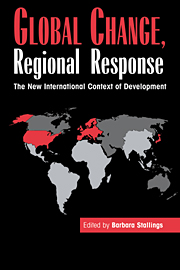Book contents
- Frontmatter
- Contents
- List of tables and figures
- List of contributors
- Acknowledgments
- Abbreviations
- 1 Introduction: global change, regional response
- Part I Global changes
- Part II Regional responses
- 7 The East Asian NICs: a state-led path to the developed world
- 8 Southeast Asia: success through international openness
- 9 Latin America: toward a new reliance on the market
- 10 Sub-Saharan Africa: underdevelopment's last stand
- Part III Conclusions
- Index
10 - Sub-Saharan Africa: underdevelopment's last stand
Published online by Cambridge University Press: 05 June 2012
- Frontmatter
- Contents
- List of tables and figures
- List of contributors
- Acknowledgments
- Abbreviations
- 1 Introduction: global change, regional response
- Part I Global changes
- Part II Regional responses
- 7 The East Asian NICs: a state-led path to the developed world
- 8 Southeast Asia: success through international openness
- 9 Latin America: toward a new reliance on the market
- 10 Sub-Saharan Africa: underdevelopment's last stand
- Part III Conclusions
- Index
Summary
As the world watches the horror of endemic violence, state disintegration, refugees, and starvation in Somalia and Rwanda, it is worth noting the more disquieting fact that an increasing number of African states are tottering on the brink, threatening to follow Somalia and Rwanda into the abyss. These now include Liberia, Chad, Zaire, Sudan, Togo, and Angola. Nor is the postindependence record elsewhere encouraging. Previous African “success stories,” like Ivory Coast and Kenya, are now assailed by chronic political and economic problems. Flickers of hope are few, small, and far between – Botswana, Mauritius, and, perhaps, Ghana, Zambia, and Zimbabwe. And, of course, great hopes are held out for South Africa, but it too can be expected to encounter many difficulties on the road from apartheid to a nonracial democracy.
Against this backdrop, economic performance of most African states south of the Sahara in the past two decades gives little cause for cheer, particularly to the ordinary citizens of the region. After registering average annual per capita growth rates of 2.9 percent in the immediate postindependence period (1965–73), the rate has since experienced consistent decline, stagnating at 0.1 percent between 1973 and 1980, and falling by 0.8 percent on average between 1980 and 1992. At best, therefore, most Africans are as poor as they were at independence 30 years ago.
- Type
- Chapter
- Information
- Global Change, Regional ResponseThe New International Context of Development, pp. 309 - 346Publisher: Cambridge University PressPrint publication year: 1995
- 2
- Cited by



